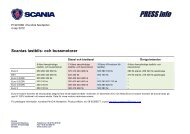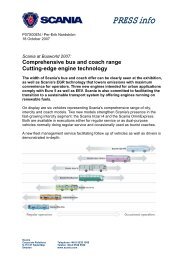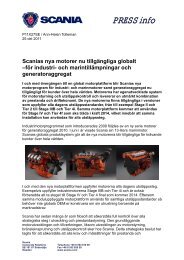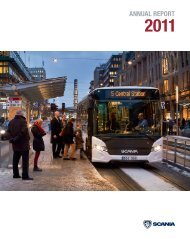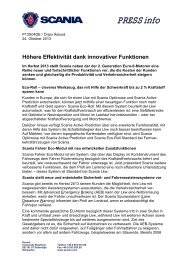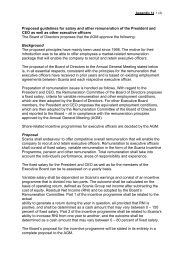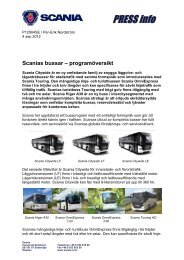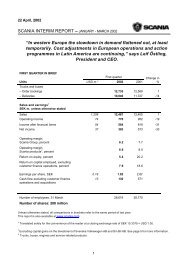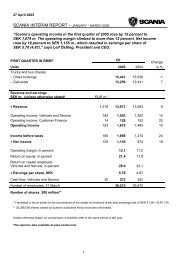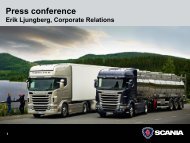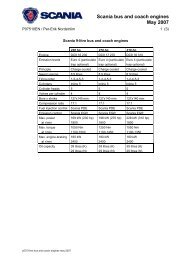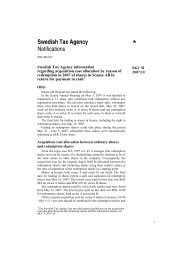Scania annual report 2003
Scania annual report 2003
Scania annual report 2003
Create successful ePaper yourself
Turn your PDF publications into a flip-book with our unique Google optimized e-Paper software.
DEVELOPMENT OF A NEW TRUCK<br />
A truck with lower operating cost and<br />
environmental impact<br />
<strong>Scania</strong>’s customers want reliable vehicles<br />
that give them the lowest possible<br />
operating cost. The tough competition<br />
that today’s hauliers face<br />
means that even marginal improvements<br />
are very important to a<br />
customer’s business. <strong>Scania</strong>’s new<br />
truck range was developed with<br />
precisely this in mind.<br />
<strong>Scania</strong>’s first Euro 4 engines are available<br />
with the R-series. These engines deliver a<br />
30 percent reduction in nitrogen oxide<br />
emissions and an 80 percent reduction in<br />
particulate matter. The new R-series provides<br />
fuel savings of several percent,<br />
which is important to the customer when<br />
vehicle fuel accounts for one-third of his<br />
total costs.<br />
This saving was achieved primarily<br />
through improved aerodynamics and electronic<br />
auxiliary systems.<br />
Lower air resistance<br />
In 1995 <strong>Scania</strong> introduced a radically altered<br />
cab design, offering exceptionally<br />
low air resistance. Since then, continued<br />
careful wind tunnel research has revealed<br />
further improvement potential. This<br />
applies, for example, to the shape, size<br />
and placement of parts that affect air flow<br />
around the vehicle. The front of the R-<br />
series, with new air deflectors and a more<br />
rounded bumper that reduces turbulence<br />
under the vehicle and creates better air<br />
flow around the wheels, is one result of<br />
this research work.<br />
Lower weight and higher<br />
cargo capacity<br />
<strong>Scania</strong>’s new truck range also features a<br />
significant reduction in weight. Lower vehicle<br />
weight means higher cargo capacity.<br />
A new frame, rear suspension and fifth<br />
wheel plus weight reductions in the steering<br />
gear and cab increase cargo capacity<br />
by up to 270 kg.<br />
<strong>Scania</strong>’s new truck range also allows<br />
a larger number of potential specifications,<br />
which means customers can tailor their<br />
vehicles especially for weight- or volumesensitive<br />
haulage work.<br />
Vehicles with increased availability<br />
While developing the new truck, <strong>Scania</strong><br />
accorded top priority to safety, quality,<br />
reliability and high availability. Availability is<br />
a factor that greatly affects the economic<br />
situation of customers. Many of the<br />
new parts, components and systems<br />
introduced in the new truck give drivers<br />
improved vehicle availability and lower<br />
operating cost.<br />
Lower emission Euro 4 engine<br />
The engine management potential provided<br />
by the new electrical system of the R-<br />
series creates a platform for future emission<br />
reductions. But as early as during<br />
2004, <strong>Scania</strong> can offer Euro 4 engines<br />
with 30 percent lower nitrogen oxide and<br />
80 percent lower particulate emissions.<br />
Engine development work at <strong>Scania</strong><br />
has always been motivated by the desire<br />
to reduce emissions without boosting<br />
the level of fuel consumption. For the researchers<br />
who perform this work, new<br />
emission regulations for the years ahead<br />
serve as an extra challenge.<br />
As a consequence, refinements of fuel<br />
injection systems and other advanced<br />
technology will reduce the exhaust emissions<br />
of the diesel engine within the near<br />
future.<br />
The development of future engines<br />
using entirely new combustion concepts,<br />
such as Homogeneous Charge Compression<br />
Ignition (HCCI), is still at an early<br />
stage. Renewable fuels are still not economically<br />
feasible for running heavy trucks.<br />
However, they may be highly suitable as<br />
raw materials for a future synthetic diesel<br />
fuel.<br />
ANNUAL REPORT <strong>2003</strong> 28



